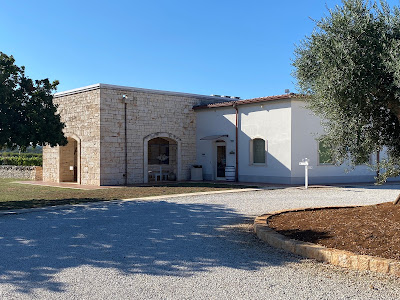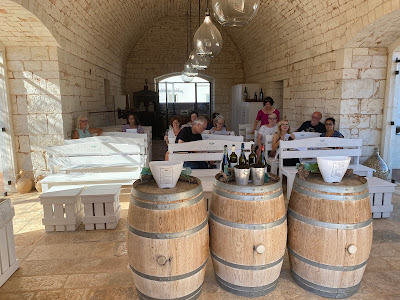Martina Franca, Puglia, Italy. Tuesday 08-August-2022.
We signed ourselves up for a week's Italian course in Alberobello and, as schools are wont to do, they organise excursions for the benefit of the students. Unfortunately, having lived here for 18 years, we have visited all these lovely towns many, many times. So we decided not to avail ourselves of the team bonding opportunities and rather slip off home at lunchtime. However we did make an exception for this wine tasting.
I Pastini are wine makers we know well having consumed their products on numerous occasions and even visited the vineyard to buy wine but have never done the tour. We were greeted by the owner who welcomed us then handed over to our guide who took us on a tour of the vineyard, cellars and the tasting room, all conducted in English and partly in Italian.
They attribute the characteristics of their wines to three factors of the terroir: the soil which is calcarious and gives minerality to the grapes, the altitude of 350m above sea level which gives warm days for sugar and cool nights for acidity and the constant wind which helps blow away flies and other pests.
Their approach is "tradition in the vineyard and technology in the cellar": they only use local grape varieties and harvest by hand but then ferment in stainless steel vats. They don't use pesticides or fertilisers (the leftover skins and stalks serve the latter purpose) but when required they use the traditional "Bordeaux mixture" which still allows for biological certification.
They grow three indigenous white varietals: Verdeca, Bianco D'Alessandro and Minutolo. The latter was in danger of dying out so they sent cuttings to a research establishment in Locorotondo for cloning and subsequent replanting back in the vineyard.
Of the indigenous red grapes, they grow Susumaniello (used for rose and red) and Primitivo however there was no mention of the other important local variety, Negroamaro.
Having had a tour of the facilities where they bottle 100,000 bottles per annum (forgot to take photos, sorry) we went into their custom-built tasting room which is a repurposed farm building. We got to taste five of their wines. Looking at their wine list we noted that about half their range is already sold out at the cantina.
The tasting was accompanied by classic Pugliese nibbles: friselle with tomatoes, taralli, olives and fried fava beans.
1759: Sparkling, Valle d'Itria I.G.P. Spumante Classico. Made by the classic champagne method from 100% Verdeca. Alcohol 12% ABV. Very pleasant with quite a yeasty palate. We have tasted this before and liked it however Mary found this one a bit too yeasty on the nose (possibly due to vintage variation).
They also do a Spumante made by the Charmat method (fermenting in pressurised steel vats), same grape, same ABV; it was sold out and we did not get to taste it.
Antico: Still white, Locorotondo D.O.P., from a blend of Verdeca 60% for acidity / freshness, Bianco D'Alessandro 35% for minerality, Minutolo 5% for aroma. They do not blend in the cellar, that is the mixture as grown in the vineyards and is harvested and processed all together. Very dry and minerally with refreshing acidity. Only 12% hence good for lunchtime or aperitif.
Rampone: Still white, Valle d'Itria I.G.P. Minutolo 100%, 12.5% ABV. More character than the Antico: quite fruity on the nose the but different on the taste. Mary liked this one so we bought a six-bottle case.
Arpago: Red, Puglia I.G.P. Primitivo 100%. Grown on a parcel of land they own down on the coast. Fruity, sweet, alcoholic (14% ABV). More to my taste than Mary's.
VersoSud. Red, Puglia I.G.P. Susumaniello 100%, 14% ABV. Fermented in steel, matured in French oak for six months. Grown on a parcel of land further south, hence the name (translation: Towards the South). We have also drunk this one many times before and we both like it so we bought six of these as well.
Fortunately we don't need to pay shipping charges: just pop the cases in the boot and take them home. Good to have some bottles ready for the expected influx of visitors later this month. Our friends are a thirsty lot!






No comments:
Post a Comment